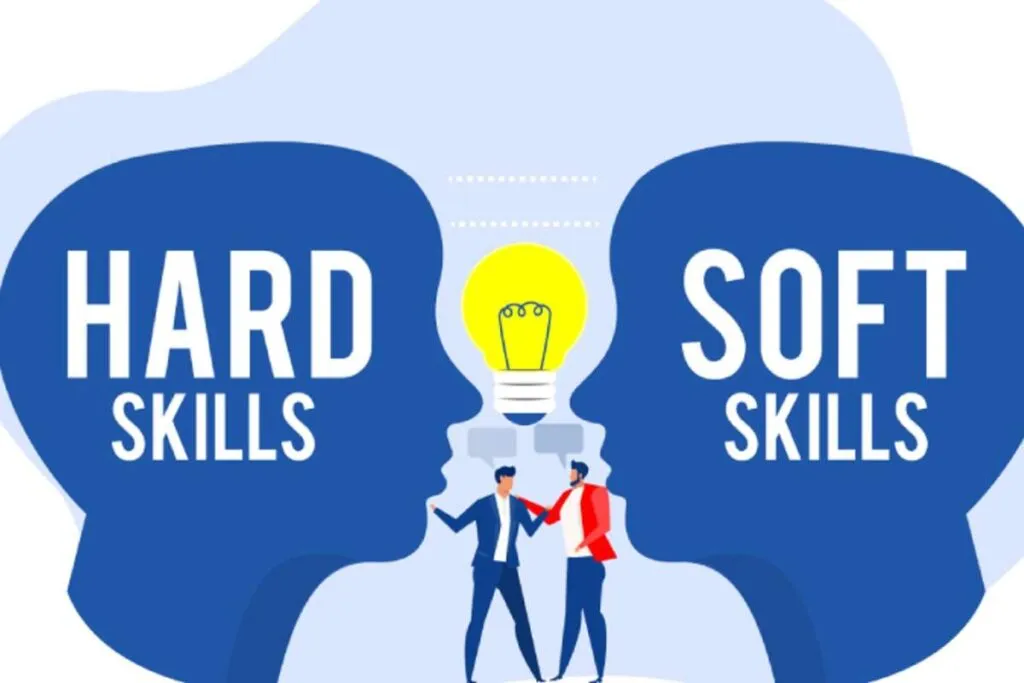Soft Skills vs Hard Skills: What Matters More for Career Advancement?
In today’s fast-changing world of work, success is no longer determined solely by what you know—it’s also defined by how you apply that knowledge. Once, hard skills such as coding, accounting, or engineering expertise were considered the ultimate ticket to professional growth. But today’s leaders, recruiters, and innovators increasingly agree: without soft skills—like communication, adaptability, empathy, and problem-solving—technical expertise alone may not take you very far.
In today’s fast-changing world of work, success is no longer determined solely by what you know—it’s also defined by how you apply that knowledge. Once, hard skills such as coding, accounting, or engineering expertise were considered the ultimate ticket to professional growth. But today’s leaders, recruiters, and innovators increasingly agree: without soft skills—like communication, adaptability, empathy, and problem-solving—technical expertise alone may not take you very far.
The question, then, is no longer “Which is more important?” but “How do soft and hard skills work together to create real, lasting career advancement?”
Let’s explore this balance—why both matter, how they shape your future, and why soft skills may quietly be the most powerful force in your professional journey.
Table of contents
- Understanding the Basics: What Are Hard and Soft Skills?
- The Evolution of the Workplace: Why the Balance Has Shifted
- How Soft Skills Drive Career Advancement
- How Hard Skills Still Matter—and Always Will
- The Ideal Formula: Balance Between Both
- Why Soft Skills Are Harder to Learn—but More Rewarding
- When Hard Skills Take the Lead
- Case Studies: The Power of Both in Action
- How to Develop Both Skill Types
- The Future of Work: Soft Skills in the Age of AI
- The Emotional Core of Career Growth
- How Companies Are Rethinking Hiring
- The Psychology Behind Skill Mastery
- Blending Both for Personal Fulfillment
- The Bottom Line: The Symbiosis of Skillsets
- Conclusion: The Real Answer to “What Matters More”
Understanding the Basics: What Are Hard and Soft Skills?
Before we weigh their importance, it’s essential to understand what these two categories actually mean.
Hard Skills
Hard skills are technical, teachable abilities that can be measured, tested, and certified. They’re the skills you learn through formal education, training, or experience. Examples include:
- Computer programming
- Data analysis
- Project management
- Graphic design
- Accounting
- Foreign language proficiency
These are the skills you list on a résumé and are often evaluated through degrees, certifications, or practical tests.
Soft Skills
Soft skills, on the other hand, are interpersonal and emotional competencies—the way you interact, lead, and collaborate with others. They reflect your personality, communication style, and emotional intelligence. Examples include:
- Communication and empathy
- Adaptability and resilience
- Problem-solving and creativity
- Leadership and teamwork
- Time management and integrity
Unlike hard skills, soft skills are not easily measured, but they make all the difference in how effectively you use your technical expertise.
The Evolution of the Workplace: Why the Balance Has Shifted
In the past, technical mastery was often enough. If you were a good engineer, accountant, or lawyer, your skillset could carry you through decades of stable employment. But the 21st-century workplace is dynamic, digital, and deeply human at the same time.
Automation and AI have made many hard skills easier to replicate. Machines can calculate, analyze, and execute faster than humans—but they can’t lead teams, empathize with clients, or innovate through emotional insight. As a result, soft skills have become the differentiating factor between good professionals and great leaders.
A 2024 LinkedIn Workplace Report revealed that 92% of hiring managers consider soft skills as important as—or more important than—hard skills. Another study by Harvard University found that 85% of career success comes from well-developed people skills, while only 15% depends on technical knowledge.
The takeaway?
Technical expertise may get your foot in the door, but soft skills determine how far you’ll go once you’re inside.
How Soft Skills Drive Career Advancement
1. Communication Builds Influence
No matter your role, the ability to communicate ideas clearly and persuasively can transform your career trajectory. Whether you’re explaining data to stakeholders or presenting a vision to your team, strong communicators bridge the gap between technical complexity and human understanding.
2. Adaptability Fuels Growth
In a world of constant change, adaptability is one of the most valuable soft skills. The most successful professionals are those who can pivot—learning new tools, navigating uncertainty, and finding opportunity in disruption.
Adaptable employees don’t fear change; they evolve with it.
3. Emotional Intelligence Enhances Leadership
Empathy, self-awareness, and emotional regulation allow leaders to manage teams effectively, resolve conflicts, and build trust. Emotional intelligence (EQ) has been linked to higher job satisfaction, improved performance, and stronger organizational cultures. In fact, leaders with high EQ outperform their peers by nearly 20% in productivity and retention rates.
4. Collaboration Creates Innovation
Innovation rarely happens in isolation. It emerges from the cross-pollination of ideas within diverse teams. The ability to listen, collaborate, and respect different perspectives turns individual effort into collective success.
5. Problem-Solving Strengthens Decision-Making
Soft skills like creativity, critical thinking, and problem-solving transform hard data into meaningful solutions. Employers increasingly value those who can interpret information, challenge assumptions, and design better ways forward.
How Hard Skills Still Matter—and Always Will
While soft skills are essential for long-term growth, hard skills remain the foundation of your expertise. You can’t lead effectively in a field you don’t understand.
Here’s why hard skills still play a crucial role:
- They establish credibility. Hard skills demonstrate that you’re qualified and capable in your discipline.
- They open doors. Most careers require a base level of technical proficiency before you can even apply soft skills effectively.
- They evolve with technology. Continuous learning keeps you relevant in rapidly changing industries.
- They enable innovation. Mastering your craft gives you the confidence and knowledge to think creatively within it.
In essence, hard skills get you in the game, but soft skills help you win it.
The Ideal Formula: Balance Between Both
Career advancement doesn’t depend on choosing one over the other—it’s about integrating both seamlessly.
| Career Stage | Hard Skills Needed | Soft Skills Needed | Example |
|---|---|---|---|
| Entry Level | Technical proficiency, task execution | Communication, teamwork, time management | A junior analyst using Excel to produce reports while collaborating effectively with teammates. |
| Mid-Level | Cross-disciplinary knowledge, data interpretation | Adaptability, critical thinking, problem-solving | A marketing manager using analytics tools and creative thinking to design data-driven campaigns. |
| Senior/Leadership Level | Strategic expertise, decision-making | Emotional intelligence, leadership, vision-setting | A director who not only understands business metrics but inspires people to achieve them. |
The higher you rise, the more the scales tip toward soft skills. Technical ability remains important, but influence, empathy, and adaptability take center stage.
Why Soft Skills Are Harder to Learn—but More Rewarding
Ironically, “soft” skills are often the hardest to master. They require emotional growth, patience, and self-awareness—traits that can’t be memorized or quickly certified.
Developing soft skills demands practice in real-world interactions, reflection, and sometimes unlearning old habits. You can’t download empathy, and there’s no shortcut to mastering communication.
Yet this very difficulty makes soft skills invaluable. They differentiate you in ways that cannot be automated or replicated. A computer may analyze data, but it cannot mentor a colleague, lead a diverse team, or inspire trust in a crisis.
When Hard Skills Take the Lead
There are situations where hard skills dominate—particularly in technical or specialized fields. Surgeons, software developers, and architects must rely heavily on precision and expertise. In these cases, your credibility depends on mastery of your craft.

However, even here, soft skills make the difference between competence and excellence. A brilliant surgeon still needs bedside manner. A talented coder must work within a team. An architect must communicate ideas to clients. In every field, human connection enhances technical performance.
Case Studies: The Power of Both in Action
Case 1: The Engineer Turned Leader
Arun began his career as a mechanical engineer. His technical skills were impeccable, but for years, he remained in the same position while others advanced. It wasn’t until he started focusing on communication and emotional intelligence—mentoring juniors, presenting ideas confidently, and managing conflict—that he was promoted to project manager. His hard skills made him competent; his soft skills made him a leader.
Case 2: The Designer Who Could Speak the Language of Business
Maria, a graphic designer, was known for her creative talent but struggled to get client buy-in. By improving her soft skills—particularly negotiation and storytelling—she began to present designs in ways that aligned with business objectives. Within a year, she wasn’t just designing logos; she was leading brand strategy meetings.
Case 3: The Data Analyst Who Bridged the Gap
James, a data analyst, realized that while he could build brilliant dashboards, few stakeholders understood them. He invested time in developing communication and visualization skills. Soon, executives sought him out not just for reports, but for insights. His soft skills turned raw data into decision-making gold.
How to Develop Both Skill Types
Developing Hard Skills
- Take specialized courses – online or offline.
- Earn certifications – to validate expertise.
- Practice through projects – real-world application sharpens understanding.
- Stay current – technology evolves quickly; continuous learning is key.
Developing Soft Skills
- Seek feedback – from peers, mentors, and managers.
- Engage in active listening – truly hear others before responding.
- Practice empathy – understand perspectives beyond your own.
- Develop self-awareness – reflect on your emotional responses and communication style.
- Read widely – literature, psychology, and philosophy deepen understanding of human behavior.
The best professionals make skill-building a lifelong habit—adapting, learning, and evolving both technically and emotionally.
The Future of Work: Soft Skills in the Age of AI
As automation reshapes industries, many technical tasks are becoming digitized. Yet, this shift is elevating the importance of soft skills.
According to the World Economic Forum’s “Future of Jobs” report, the top skills employers seek by 2030 will include:
- Complex problem-solving
- Critical thinking
- Creativity
- Emotional intelligence
- Leadership and social influence
These are deeply human abilities—irreplaceable by technology. While AI can process information, it can’t replicate human connection, ethics, or intuition. Thus, the professionals of the future will be those who combine digital fluency with human fluency.
The Emotional Core of Career Growth
When you think about the people who’ve inspired your professional journey—mentors, managers, or colleagues—it’s rarely their technical brilliance you remember most. It’s how they made you feel, how they encouraged your growth, and how they navigated challenges with grace.

That’s the magic of soft skills. They transform workplaces from cold systems into thriving ecosystems of trust, collaboration, and purpose.
Hard skills may make you efficient, but soft skills make you effective.
Hard skills may win projects, but soft skills win people.
And in the long run, people are what build careers.
How Companies Are Rethinking Hiring
Modern organizations are reimagining hiring and promotion processes to emphasize both skill types:
- Behavioral interviews now assess teamwork, adaptability, and communication.
- Skill-based hiring focuses on portfolios and problem-solving tasks instead of degrees.
- Continuous learning programs encourage employees to balance technical growth with emotional intelligence training.
Google, for example, found through its internal research (Project Oxygen) that the best-performing teams weren’t led by the most technically skilled managers—but by those who showed empathy, listened well, and supported others’ development.
The corporate world is learning a profound truth: culture and collaboration drive long-term success more than technical excellence alone.
The Psychology Behind Skill Mastery
Hard skills appeal to logic and structure—they’re predictable, quantifiable, and safe. Soft skills, however, touch emotion, vulnerability, and uncertainty. That’s why many professionals find them harder to cultivate.
Yet, neuroscience shows that emotional intelligence directly enhances cognitive performance. When we feel psychologically safe, we think more creatively, learn faster, and perform better. Thus, building soft skills doesn’t just improve relationships—it enhances technical execution too.
Blending Both for Personal Fulfillment
Career advancement isn’t just about titles or pay raises—it’s about becoming more capable, confident, and complete. Developing both skill types enriches not only your professional life but your personal growth as well.
When you balance logic with empathy, analysis with intuition, and knowledge with wisdom, you don’t just succeed—you thrive.
The Bottom Line: The Symbiosis of Skillsets
The truth is, soft skills and hard skills aren’t rivals—they’re partners.
One gives you competence; the other gives you connection.
One builds your reputation; the other builds your relationships.
Together, they create a career that’s both impactful and meaningful.
As industries evolve and roles shift, adaptability and emotional intelligence will become the anchors that keep professionals grounded and growing. Whether you’re an engineer, artist, or entrepreneur, mastering this balance will define your success.
Conclusion: The Real Answer to “What Matters More”
So, what matters more for career advancement—soft skills or hard skills?
The answer is both—but in different ways.
Hard skills may open the first door.
Soft skills ensure every other door stays open after that.
The future belongs to those who can code and communicate, calculate and collaborate, lead with both intellect and heart. Because in the end, true success isn’t about being the smartest person in the room—it’s about being the one who helps everyone else shine.
Stay Inspired on Your Career Journey
If this article got you thinking about what really drives success, here are a few more reads that will help you grow, adapt, and thrive in your professional life:
- Strategies for Growth and Resilience – Discover how to bounce back from challenges and build a lasting mindset for success.
- Mastering Workplace Conflict: Effective Strategies for Resolution and Growth – Turn disagreements into opportunities for learning and leadership.
- The Art of Productivity: How to Get More in Less – Learn smart ways to stay efficient without burning out.
- Practical Strategies, Money Affirmations, and Success Stories – Boost your confidence and financial mindset with powerful affirmations.
- Empower Your Growth: A Comprehensive Guide to Personal Development – Explore how intentional self-growth can open new doors in your career.
The Positivity Collective
The Positivity Collective is a dedicated group of curators and seekers committed to the art of evidence-based optimism. We believe that perspective is a skill, and our mission is to filter through the noise to bring you the most empowering wisdom for a vibrant life. While we are not clinical professionals, we are lifelong students of human growth, devoted to building this sanctuary for the world.
